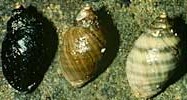Nucella emarginata
| Nucella emarginata | |
|---|---|

| |
| Scientific classification | |
| Domain: | Eukaryota |
| Kingdom: | Animalia |
| Phylum: | Mollusca |
| Class: | Gastropoda |
| Subclass: | Caenogastropoda |
| Order: | Neogastropoda |
| Family: | Muricidae |
| Genus: | Nucella |
| Species: | N. emarginata
|
| Binomial name | |
| Nucella emarginata (Deshayes, 1839)
| |
| Synonyms[1] | |
| |
Nucella emarginata, common name the emarginate dogwinkle, is a species of medium-sized predatory sea snail, a marine gastropod mollusk in the family Muricidae, the murex snails or rock snails.[1]
Description
[edit]N. emarginata is a rocky intertidal gastropod carnivore that feeds on a variety of sessile and sedentary species such as barnacles, mussels, and limpets.[2] The adult shell size of this species can reach 25 mm or 30 mm.
This section needs expansion. You can help by adding to it. (January 2011) |
Feeding
[edit]N. emarginata attacks prey by drilling. It has a special organ called the accessory boring organ, or ABO, that contains acid which it uses to dissolve a small hole in the shell of its prey.[3][4][5] When drilling, it alternates acid secretions with scraping by its radula until it has fully penetrated the prey's shell, leaving a characteristic hole about 1 mm in diameter.[5] The speed of this process likely depends on temperature,[6] and the size of the hole depends on the size of the dogwhelk's accessory boring organ, which is generally larger in larger dogwhelks.[7] Finally, when the hole is complete, the dogwhelk inserts its proboscis into the hole to feed.
Distribution
[edit]This species lives in mid-intertidal zones and often lives among mussels such as Mytilus californianus.[8] Formerly known as N. ostrina, the two species were differentiated based on shell morphology, reproductive compatibility, and genetic sequencing in 1990.[8] N. emarginata is now known to be distributed between Fort Point, California and Pacific Mexico.[9]
References
[edit]- ^ a b Nucella emarginata (Deshayes, 1839). Retrieved through: World Register of Marine Species on 10 January 2011.
- ^ West, L., 1986. Interindividual variation in prey selection by the snail Nucella (= Thais) emarginata. Ecology 67, 798–809. https://doi.org/10.2307/1937702
- ^ Gruber, G.L., Carriker, M.R., 1990. A note on the accessory boring organ and shell boring by the "Loco", Concholepas concholepas (Muricidae, Gastropoda). Bulletin of Marine Science 47, 739–744.
- ^ Carriker, M.R., Gruber, G.L., 1999. Uniqueness of the Gastropod Accessory Boring Organ (ABO) Comparative Biology, an Update. Journal of Shellfish Research 18, 579–595.
- ^ a b Carriker, M.R., 1981. Shell penetration and feeding by Naticacean and Muricacean predatory gastropods: a synthesis. Malacologia 20, 403–422
- ^ Miller, L.P., 2013. The effect of water temperature on drilling and ingestion rates of the dogwhelk Nucella lapillus feeding on Mytilus edulis mussels in the laboratory. Marine Biology 160, 1489–1496. https://doi.org/10.1007/s00227-013-2202-z
- ^ Kowalewski, M., 2004. Drill holes produced by the predatory gastropod Nucella lamellosa (Muricidae): Palaeobiological and ecological implications. Journal of Molluscan Studies 70, 359–370. https://doi.org/10.1093/mollus/70.4.359
- ^ a b Palmer, A., Gayron, S., Woodruff, D., 1990. Reproductive, morphological, and genetic evidence for two cryptic species of Northeastern Pacific Nucella. The Veliger 33, 15.
- ^ Marko PB (1998) Historical allopatry and the biogeography of speciation in the prosobranch snail genus Nucella. Evolution (NY) 52:757–774
- Marko P.B., Palmer A.R. & Vermeij G.J. (2003) Resurrection of Nucella ostrina (Gould, 1852), lectotype designation for N. emarginata (Deshayes, 1839), and molecular genetic evidence of Pleistocene speciation. The Veliger 46(1): 77-85
External links
[edit]- "Nucella emarginata". Gastropods.com. Retrieved 10 January 2011.
- A Snail's Oddyssey: Whelks and Relatives
- Deshayes, G. P. (1839). Nouvelles espèces de mollusques, provenant des côtes de la Californie, du Mexique, du Kamtschatka et de la Nouvelle-Zélande. Revue Zoologique par la Société Cuvierienne. (1839) 2 (12): 356-361
